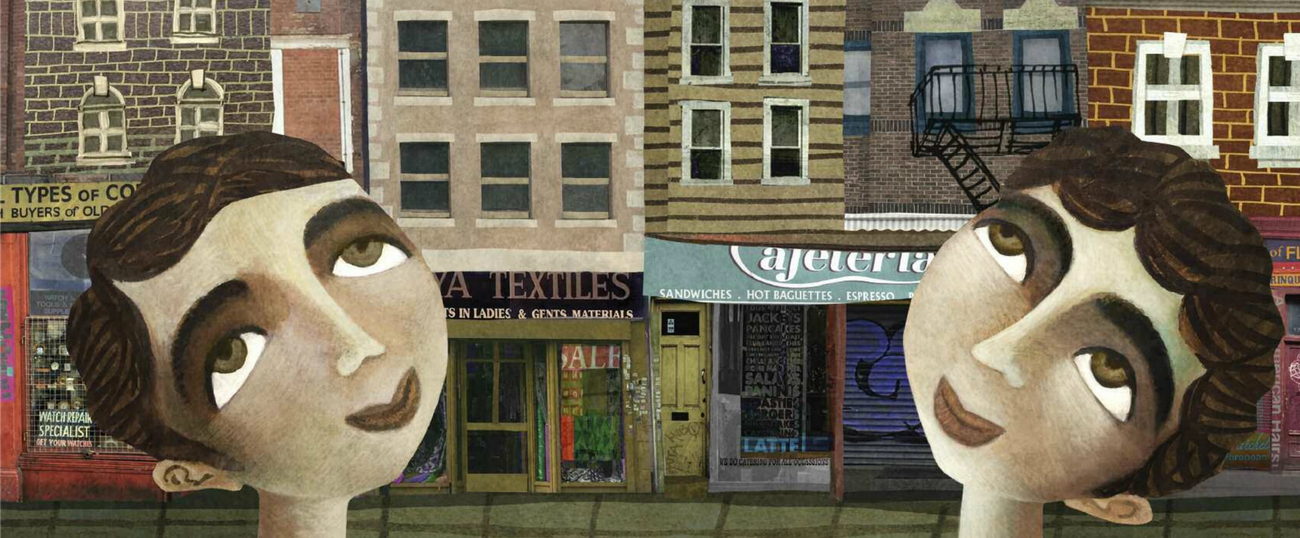Perfect Family Reading for the High Holidays
The story of a rambunctious Jewish boy named Moses and a rambunctious Muslim boy named Mohammed, told with fine detail and exquisite art




We need fairy tales right now. And the breathtakingly lovely A Moon for Moe and Mo, by Jane Breskin Zalben, illustrated by Mehrdokht Amini, fits the bill. It’s the story of a rambunctious Jewish boy named Moses and a rambunctious Muslim boy named Mohammed who meet in a flurry of powdered sugar and tumbling nougat in a Middle Eastern grocery in Brooklyn (spoiler alert for the locals: It’s Sahadi’s!). Zalben and Amini make a brilliant team. The former teaches children’s book writing at The School of Visual Arts in NYC and is the author of the hilarious Brenda Berman, Wedding Expert, which was on Tablet’s Best Jewish Children’s Books list in 2009. The latter is the illustrator of the ravishing Golden Domes and Silver Lanterns, a little-kid-friendly introduction to Muslim art and culture bursting with pattern and color.
In this simple story, two extremely high-energy little boys rampage through a shop on Flatbush Avenue where the shelves brim with olives and baklava, turmeric and star anise, pickles and pita.
The air smelled of spices and fresh teas.
Baskets were filled with apricots, figs, dates,
nuts, and pomegranates bursting with seeds
that glistened like little red jewels.
Both boys are blessed with curly hair and sweet smiles. Both mothers are exhausted. (But chic! Mrs. Feldman wears a green botanic-print dress—very Boden—and Mrs. Hassan sports a peach-and-russet coat with a Suzani-esque pattern, a lush blue head scarf, checkerboard leggings and yellow high tops.) The boys bounce a pink rubber ball to each other (which is how I learned that autocorrect does not know Spaldeen; I am old). To distract them, Mr. Sahadi, who’d initially thought they were twins, gives them each a less-potentially-destructive ball of falafel instead. The two return to their respective homes so that their moms can cook for Rosh Hashanah and Ramadan, but Moe gets rugelach dough everywhere and Mo knocks the chopped dates meant for date cookies all over the floor. As all moms everywhere know, this means it is time to go to the park. And there the boys meet again and an interfaith friendship develops, culminating with a picnic in Prospect Park on a glorious purple and indigo patterned blanket.
At sundown they feasted under a leafy tree.
Mo brought date cookies crumbled with almonds.
Moe brought rugelach rolled with raisins.
“Shalom,” said Moe’s family, wishing peace.
“Salaam,” said Mo’s family, wishing peace.
Amini’s art,created in acrylic, markers, ink, and photo collage,is luminous, layered and lively, spiking riotous color with snippets of cut-out text. At the end of the book, we get an explanation of both Rosh Hashanah and Ramadan, plus recipes for rugelach and date cookies. Unlike some well-intentioned children’s books, A Moon for Moe and Mo gets the details right. Zalben knows that tzedakah doesn’t only refer to money (a mistake many Jews make!) and avoids generalizations, noting, for example, that “Different foods are eaten in different countries, since there are many Muslims throughout the world.”
In an afterword, Amini tells us that she was “overjoyed by the possibility of working on a book about empathy, the beauty of similarities, and the ease with which children form deep friendships.” Zalben notes that the Hebrew and Muslim calendars both follow a lunar cycle (though Ramadan and Rosh Hashanah overlap only every 30 years or so) and points out that the Hebrew and Arabic words for compassion, rahamim and rahma, share the same root.
May we all, young and old, have compassion for each other in the next lunar year.
Marjorie Ingall is a former columnist for Tablet, the author of Mamaleh Knows Best, and a frequent contributor to the New York Times Book Review.